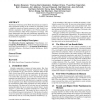Free Online Productivity Tools
i2Speak
i2Symbol
i2OCR
iTex2Img
iWeb2Print
iWeb2Shot
i2Type
iPdf2Split
iPdf2Merge
i2Bopomofo
i2Arabic
i2Style
i2Image
i2PDF
iLatex2Rtf
Sci2ools
GECCO
2006
Springer
2006
Springer
High-order punishment and the evolution of cooperation
The Prisoner's Dilemma and the Public Goods Game are models to study mechanisms leading to the evolution of cooperation. From a simplified rational and egoistic perspective there should be no altruistic cooperation in these games at all. Previous studies observed circumstances under which cooperation can emerge. This paper demonstrates that high-order punishment opportunities can maintain a higher cooperation level in an agent based simulation of the evolution of cooperation. Categories and Subject Descriptors H.4 [Information Systems Applications]: Miscellaneous; I.2.1 [Computing Methodologies]: Artificial IntelligenceApplications and Expert Systems[Games]; I.2.11 [Computing Methodologies]: Artificial Intelligence--Distributed Artificial Intelligence, Intelligent agents General Terms Experimentation Keywords IPD, Public Goods Game, Cooperation, Punishment
Altruistic Cooperation | Computing Methodologies | GECCO 2006 | Optimization | Studies Observed Circumstances |
| Added | 23 Aug 2010 |
| Updated | 23 Aug 2010 |
| Type | Conference |
| Year | 2006 |
| Where | GECCO |
| Authors | Bastian Baranski, Thomas Bartz-Beielstein, Rüdiger Ehlers, Thusinthan Kajendran, Björn Kosslers, Jörn Mehnen, Tomasz Polaszek, Ralf Reimholz, Jens Schmidt, Karlheinz Schmitt, Danny Seis, Rafael Slodzinski, Simon Steeg, Nils Wiemann, Marc Zimmermann |
Comments (0)

